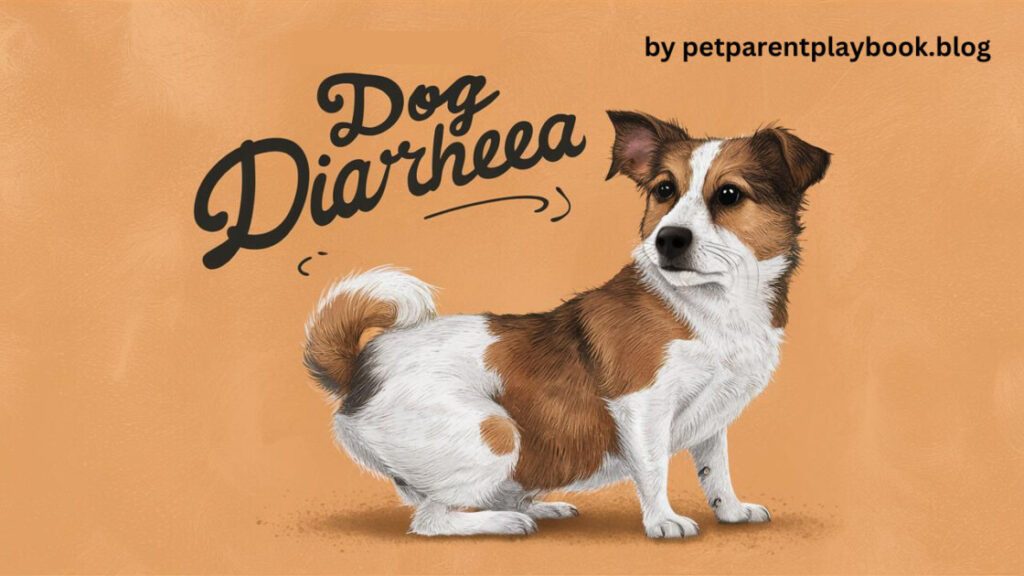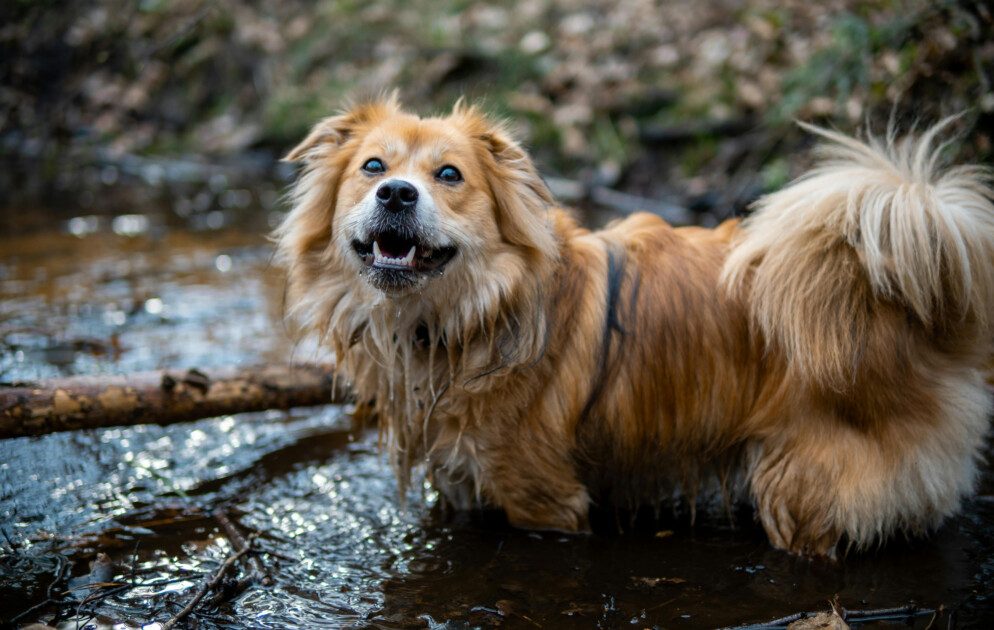My Dog Has Diarrhea But Is Acting Fine? | It’s every pet owner’s nightmare: you notice your furry friend has diarrhea, but they’re acting completely normal. No lethargy, no vomiting, just loose stools. While it’s tempting to breathe a sigh of relief, diarrhea can be a sign of something more serious, so it’s important to understand the potential causes and when to call the vet.
Been There, Done That
Just a few weeks ago, I woke up to find a rather unpleasant surprise left by my normally healthy Labrador, Luna. She greeted me with her usual tail wags and excitement, completely unfazed by her digestive woes. Naturally, I was worried, but Luna’s happy demeanor had me wondering if a trip to the vet was necessary.

Why Does My Dog Have Diarrhea But Act Normal?
There are several reasons why your dog might have diarrhea without showing other signs of illness:
- Dietary Indiscretion: This is the most common culprit. Maybe Luna got into the trash, scarfed down some forbidden human food, or ate a sudden change in diet a little too quickly.
- Parasites: Intestinal parasites like roundworms or giardia can cause diarrhea, but often without other symptoms.
- Stress: Just like us, dogs can get stressed by things like travel, boarding, or new pets in the house. This stress can manifest as digestive upset.
- Mild Viral or Bacterial Infection: Some viruses or bacteria can cause short-lived diarrhea without making your dog feel unwell.
What to Do When Your Dog Has Diarrhea | My Dog Has Diarrhea But Is Acting Fine?
Here’s how I handled Luna’s situation:
- Monitor Closely: I kept a close eye on Luna’s behaviour, appetite, and stool frequency. If she seemed lethargic, stopped eating, or the diarrhea worsened, I knew a vet visit was crucial.
- Withhold Food (For a While): I gave Luna’s stomach a break by withholding food for 12 hours. This allows the digestive system to rest and hopefully clear out the irritant.
- Bland Diet: After the 12-hour fast, I introduced a bland diet of boiled chicken and white rice. This is easy for their stomachs to digest and helps firm up stool.
- Plenty of Water: Diarrhea can lead to dehydration, so I made sure Luna had access to plenty of fresh water throughout the day.
Call the Vet If…
While Luna’s case thankfully resolved itself with a bland diet, there are situations where a vet visit is essential:
- Diarrhea lasts more than 2 days
- Diarrhea is bloody or contains mucus
- Your dog is vomiting
- Your dog is lethargic or seems in pain
- Your dog is a puppy or senior dog (their immune systems are weaker)
My Experience with Luna Ended Well
Thankfully, after a day and a half of bland food, Luna’s stools returned to normal. It was a stressful experience, but by monitoring her closely and taking the right steps, I was able to avoid a trip to the vet.
Remember: I’m not a veterinarian, and this is not a substitute for professional advice. If you’re ever concerned about your dog’s health, always err on the side of caution and consult your vet.
Keeping Your Dog Healthy
Here are some tips to help prevent future digestive issues:
- Feed your dog a high-quality diet
- Introduce any dietary changes gradually
- Keep your dog away from garbage and potential toxins
- Practice good hygiene to prevent parasites
- Schedule regular vet checkups
By following these tips and being observant of your dog’s habits, you can help ensure a happy and healthy digestive system for your furry friend.
Going Beyond the Bland: Additional Tips for Managing Doggy Diarrhea
So, your dog has diarrhea and you’ve implemented the initial steps: monitoring, withholding food briefly, and introducing a bland diet. But what if things aren’t quite back to normal yet? Here are some additional tips to help soothe your dog’s tummy and get them back on track:

Probiotics: These natural supplements help restore the balance of good bacteria in your dog’s gut. This can be particularly helpful after a course of antibiotics or if your dog suffers from chronic digestive issues. Talk to your vet about choosing the right probiotic for your dog.
Pumpkin: Plain canned pumpkin (not pumpkin pie filling!) is a wonderful source of fiber, which can help firm up loose stools. Start with a tablespoon or two mixed into your dog’s bland diet and adjust based on their size and stool consistency.
Electrolytes: Diarrhea can lead to electrolyte imbalances, especially if your dog is vomiting as well. There are commercial electrolyte replacement solutions available at pet stores, or you can ask your vet about homemade options.
Keep it Simple: While Luna was recovering, I avoided giving her any treats or chews that might irritate her stomach further. Stick to the bland diet until their stools are firm and regular again.
Slow Reintroduction: Once your dog’s diarrhea has resolved, gradually reintroduce their regular food back into their diet. Mix a small amount of their old food with the bland diet, slowly increasing the ratio over several days. This helps their digestive system adjust and reduces the risk of another flare-up.
Consider Underlying Issues: If your dog’s diarrhea is chronic or accompanied by other symptoms like vomiting or weight loss, there could be an underlying medical condition at play. Don’t hesitate to schedule a vet visit to rule out any serious issues.
World Small Animal Veterinary Association (WSAVA): This international organization provides a client handout on canine diarrhea, offering clear explanations for pet owners: https://wsava.org/global-guidelines/global-nutrition-guidelines/
By being proactive and providing supportive care, you can help your dog recover from diarrhea quickly and comfortably. Remember, a healthy gut is a happy gut, which leads to a happy and healthy dog!
Also Read –
Is Your Next Best Friend a Mystery? The Unexpected Joy of Mutt Dogs
VIP Pet Care: 101 A Guide to Preventive Wellness for Your Furry Friend
FAQ: My Dog Has Diarrhea But Seems Fine – What Do I Do?
Q: My dog has diarrhea, but they’re acting normal. Should I be worried?
A: While a happy demeanor is a good sign, diarrhea can indicate underlying issues. Monitor your dog closely, and call the vet if the diarrhea persists for more than 2 days, contains blood or mucus, or is accompanied by vomiting, lethargy, or loss of appetite.
Q: What could be causing my dog’s diarrhea?
A: Common culprits include dietary indiscretion (eating something they shouldn’t have), parasites, stress, or mild infections.
Q: What should I do if my dog has diarrhea?
A: Here are some initial steps:
Monitor your dog’s behavior and stool frequency.
Withhold food for 12 hours to allow their stomach to rest.
Introduce a bland diet of boiled chicken and white rice.
Ensure your dog has plenty of fresh water to avoid dehydration.
Q: When should I call the vet about my dog’s diarrhea?
A: If the diarrhea is severe, bloody, or lasts longer than 2 days, consult your vet immediately. Also call the vet if your dog is vomiting, lethargic, seems in pain, or is a puppy or senior dog (weaker immune systems).
Q: How can I prevent future dog diarrhea episodes?
A: Here are some tips:
Feed your dog a high-quality diet.
Introduce any dietary changes gradually.
Keep your dog away from garbage and potential toxins.
Practice good hygiene to prevent parasites.
Schedule regular vet checkups.
Q: What are some additional things I can do to help my dog recover from diarrhea?
A: Consider probiotics, plain canned pumpkin for fiber, and electrolyte replacement solutions to restore gut health and prevent dehydration. Slowly reintroduce your dog’s regular food once their stools are normal again.
By understanding the causes of dog diarrhea and taking the right steps, you can help your furry friend feel better fast!
Remember, this FAQ is for informational purposes only and should not replace professional veterinary advice.